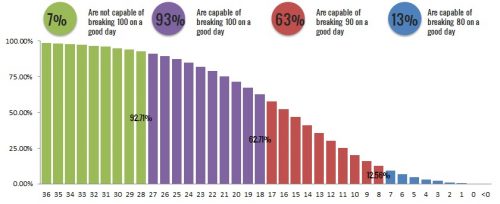I have been engaged in a golf handicap discussions quite a bit of late. The first set of discussions are prompted by the fact that I changed my playing status from amateur to pro. The second set of discussions have revolved around how to run junior tournaments.
What is a golf handicap?
A golf handicap is a measure of ones potential (note, it says potential not standard ability). It’s a number derived from calculations based on the scores one returns. In the past, these calculations have varied from country to country or region to region. However, the new World Handicap System was recently unveiled to create a uniform way of calculating the handicap. A handicap is used to enable players of varying abilities to compete against one another.
Of note in the definition is the use of the word potential. Todaysgolfer.co.uk did an analysis of all rounds submitted in 2017. There conclusion shows that one is supposed to play to their handicap one out of 3 or 4 rounds of golf. If you play to your handicap more often than that, then your handicap needs to be reviewed.
Do pros have a handicap?
In Kenya, the belief is that once one turns pro, they automatically become handicap 0 or scratch. There is no rule in golf that states that. The misconception comes from the fact that professional golf tournament are played with no handicaps. That does not mean that pros do not or cannot have handicaps. As a matter of fact, most pros do have handicaps and it’s important for them to have one.
Top amateur events are also played with no handicap. That does not mean that all the top amateur don’t have a handicap or are at the same playing ability. In both these cases, the no handicap rule is dictated by the conditions of play (CoP). The rules of golf require each tournament to have its own condition of play. Therefore, all professional golf tournaments inherently have the condition that winner will be determined by the gross scores.
In Kenya, most professional golfers choose not to keep a handicap. This has fed into the believe that pro golfers do not have a handicap. Internationally, most professional golfer actually keep a handicap in their home clubs. Tiger Woods, Rory Mclory, Phil Mickelson, Dustin Johnson, Bubba Watson are just some of the top world players with a handicap. These players actually participate in some of their local club competitions with their handicaps. It is also common knowledge that these world class professional do gamble with amateur golfers, can you imagine a +7 pro betting against a handicap 2 player with no handicap?
Handicapping junior golfers
The questions I’ve been asked often of late is, “how are junior golfers handicapped?”. In my opinion, the need to handicap juniors is wrongly driven by the fact that most adults Kenyan golfers started to play the game late in their life. And before they could play any competition, a handicap was a requirement. This has led to the misconception that juniors (no matter the age) also need to be handicapped. They forget that handicaps can only be issued from rated tees for players who can play to a certain score.
So, when can juniors be handicapped? The answer is that it depends with their playing ability. If a junior can play to an average of double bogey on rated tees, then by all means they can be handicapped. In CONGU system that means boys playing from men’s tees and girls playing from ladies tees. Otherwise juniors are generally not handicapped. internationally their competitions do not require a handicap. The new World Handicap System will allow juniors to be handicapped sooner because the tees will be genderless. Each tee will be rated for both ladies and men.
It is not plausible to expect an average 8 year old to play a course that’s 6,500 – 7.200 yards long and average a triple bogey. For that reason, it’s not reasonable to handicap them. Another reason is that you’re teaching them to depend on a support system (handicap) and use it as a clutch in competition. Competitions determined by gross scores force a junior to play the best golf on every hole without relying on the handicap to bail them out. This allows them to focus on improving their gross scores and thus quicker development in their golfing ability. The important consideration is to be able to get juniors to compete with others within their age groups. There is a more detailed guideline on this site on how to run junior competitions equitably in a way that promotes the growth of the game.
Conclusion
Yes, the handicap system is a great tool in golf. Every golfer has a handicap whether they keep one or not. The conditions of play should determine how the handicaps should be used to make the competitions equitable. Generally, junior competitions should be age and gender based and without handicaps. No, not all pros are zero handicap. I’d argue the average Kenyan pro is between handicap 3 and 6 and only a handful are legitimately zero or plus handicaps. Pros should be encouraged to keep handicaps; but I doubt this will be welcomed by most. It evens out the field when they bet with amateurs because some of them might be plus handicaps and allowing them to play from scratch gives them undue advantage. Even the Kamari’s have conditions of play that dictate the rules of gambling for each group or game.


